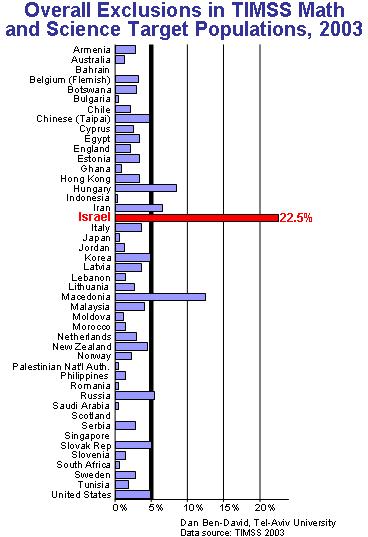Haaretz, December 23, 2004.
Dan Ben-David Tel-Aviv University There are those who believe that one of the main goals of the educational system should be to educate for values. Underlying this belief is the assumption that the provider of a values education to our children, the Ministry of Education, has the basic credibility needed for leading this initiative. Visualize for a moment an imaginary world in which the minister of welfare was actually more concerned about the responsibilities of his ministry, the plight of the poor, rather than in the plight of the settlers. Suppose too that before the most recent minister, Zvulun Orlev, chose to disengage from the poor - rather than to disengage from Gaza - he had held a dramatic news conference to inform the nation of his impressive success in the battle on poverty, with figures and tables depicting the change in trend. No more poverty rates among the highest in the west, because the Jewish State had discovered the secret for success. Just exclude from the national sample the ultra-orthodox population - after all, they aren't Zionist's like us - and delete others who are poor because they deserve it. Then we could get the "true" picture of poverty in Israel. Sounds ridiculous? Who could possibly have such audacity to cook the sample rather than to provide hard-boiled solutions? Welcome to the course "Principles of Values" in the department of political culture. A particularly illuminating lesson on public integrity was given several days ago by the Minister of Education, Limor Livnat. What new tidings did she bear? It turns out that our multi-decade free-fall into the educational pits of the western world has come to an end on her watch. The international TIMSS tests in math and science achievement for eighth-graders in 2003 indicate that Israel has succeeded in crawling out from the bottom of the list of western nations to a good place in the bottom third of the industrialized world. Certainly great news for the people of the book. How was the ministry able to change the direction of the trend, and all this even before implementation of the Dovrat reforms? With a little determination, it is apparently possible to accomplish quite a bit. As is specified on page 350 of the TIMSS publication of the results: "Within the desired population, countries could define a population that excluded a small percentage (less than 5%) of certain kinds of schools or students that would be very difficult or resource-intensive to test (e.g., schools for students with special needs or schools that were very small or located in extremely rural areas)." An obviously gaping loophole, if there ever was one, but evidently missed by 41 of the 46 countries for whom test scores were published (grades were not published for Syria, the 47th country) who naively thought it necessary to abide by the rules and excluded no more than 5% from their samples. 
Of the five remaining countries, Russia crossed the line with 5.5%, as did Iran (6.5%) and Hungary (8.5%). Macedonia displayed a wanton disregard for the rules by excluding 12.5% of its schools from the sample. The country with the most representative sample - albeit, of it's adults' values, rather than of its school-age population - was Israel, which excluded 22.5%, compared with the average of 2.8% for all of the other 45 countries combined. In the earlier TIMSS tests, in 1999, Israel excluded the entire group of ultra-orthodox pupils from the sample. The exclusion rate that year was 16%. But the omission of the ultra-orthodox was insufficient for enabling Israel to pull itself out of the bottom of the western educational barrel. In 2003, our exclusion rate was raised by an additional 41% (from 16 to 22.5) and this was evidently enough to deliver the goods. One other piece of information that the distinguished minister "forgot" to mention in her press conference: Each country was asked to "nominate one or more persons unconnected with their national center to serve as quality control monitors for their countries." These persons were to participate in a special TIMSS program that would provide them with the tools for independently monitoring the studies in their respective countries. As is noted on page 360 of the TIMSS publication of the results, "Iran and Israel were the only countries whose quality control monitors were not trained". Great company we keep. Fortunately, there is at least one national institution in Israel that provides a true picture of our kid's scholastic abilities. Exams given to IDF draftees include tests of their reading skills. Level 9 is considered sufficient. According to Shlomo Dovrat, 60% of the native-born army conscripts passed level 9 in the eighties. Six years ago, only 40% passed. Last year - the year of Limor Livnat's great "success" - this fell to 32%. In just one and a half decades, we managed to reduce by half the number of native-born Israelis who know how to read! So who needs educational reform when it is so simple to just delete from the sample anyone who ruins the national results? Should we also adopt this concept to the list of eligible voters in order to avoid having them ruin other national results in different areas? We definitely have a ministry of education for values. Someone whom we can learn from.
|